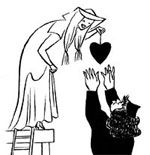
Sexual Liberation in the 90s — the 1390s
THE HERESY OF COURTLY LOVE
The sexual revolution, with its permissiveness about — even idealization of — sex outside of marriage, is not exactly new. History shows that heresies that seem to have died can spring up in stylish forms, advertising themselves as the latest thing and the newest thought. In today’s sexual revolution we find ourselves beset anew by a heresy that now calls itself sexual liberation but that in the Middle Ages was called “courtly love.” For a dramatization of the evils of this sexual heresy we need look no further than the great poet of the Middle Ages, Geoffrey Chaucer, and his tale of two lovers, Troilus and Criseyde, which I shall summarize in a moment. (Who says the old classic works of English literature are not relevant to modern times?)
The old courtly love, like the new sexual liberation, rejected Catholic teaching on sexual morality, disdained procreative sex, undermined the sacramentality of marriage, and threatened the integrity of the family. The marriage practices of that time, scholars say, may have provided fertile ground for the growth of such weeds. As C.S. Lewis puts it in his study of the literature of the period, The Allegory of Love, “Marriages had nothing to do with love, and…any idealization of sexual love, in a society where marriage is purely utilitarian, must begin by being an idealization of adultery.” Our modern marriage practices are presumably based on love and free choice, not on property or status or obligation. Hence one would expect that modern marriages would incorporate romance and love. Yet, as we turn marriage into a mere temporary contract — a private arrangement between individuals that is cancelable at will — we see the same weeds that festered in the Middle Ages sprouting in what should be the hallowed ground of matrimony.
In those days the writers and musicians called troubadours extolled in verse and song the beauty and romance of love affairs without benefit of marriage; today our filmmakers and musicmakers and writers extol the same joys. The aristocrats and the high-born ladies lent the cult of courtly love an enviable air of sophistication and respectability; today our medical, legal, and educational establishments grant legitimacy to premarital sex, teenage sex, cohabitation, legalized abortion, no-fault divorce, “safe sex,” and same-sex “marriage.” The poets of courtly love ridiculed marriage as an oppressive institution that stifles romance; today the apologists for sexual freedom deconstruct the family and view children as disposable and large families as detrimental to “quality of life.”
You May Also Enjoy
There is a spiritual hunger raging inside young people today: They hunger for values that…
Popular legends are strange mixtures with curious effects. Although their historical elements may be mingled…
The Schola Cantorum of the Pacific is a living celebration of liturgy as community and music as its exalted language.

